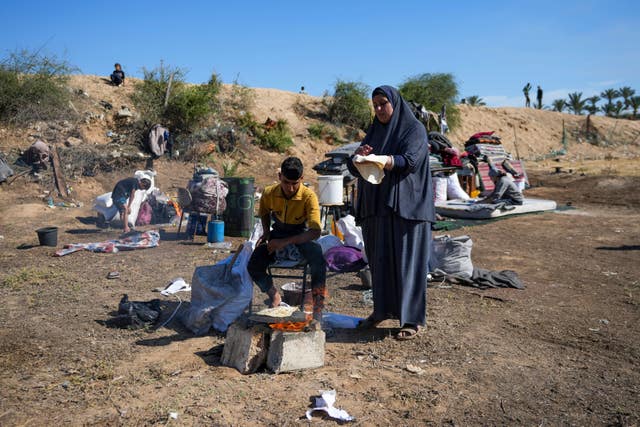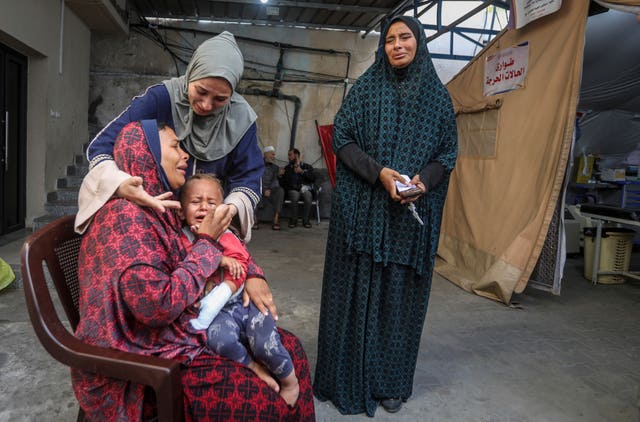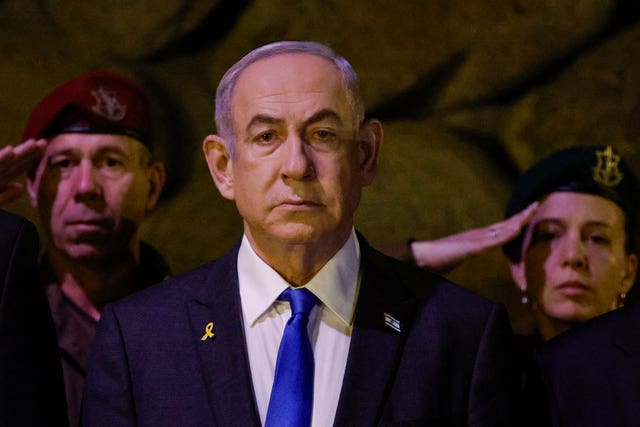Heavy fighting between Israeli troops and Palestinian militants on the outskirts of the southern Gaza city of Rafah has left crucial nearby aid crossings inaccessible and caused more than 100,000 people to flee north, a United Nations official said on Friday.
Israel’s plans for a full-scale invasion of Rafah appear to be on hold for now, with the US deeply opposed and stepping up pressure by threatening to withhold arms. But even the more limited incursion launched earlier this week threatens to worsen Gaza’s humanitarian catastrophe.
Heavy fighting was also under way in northern Gaza, where Hamas appeared to have once again regrouped in an area where Israel has already launched punishing assaults.
About 110,000 people have fled Rafah and food and fuel supplies in the area are critically low, a UN official has said.
All crossings into southern Gaza remain closed, cutting off supplies and preventing medical evacuations and the movement of humanitarian staff, said Georgios Petropoulos, an official for the UN’s Office for the Co-ordination of Humanitarian Affairs working in Rafah.
Some 1.3 million Palestinians – more than half Gaza’s population – had sought refuge in Rafah.
The World Food Programme will run out of food for distribution in southern Gaza by Saturday unless more aid arrives, Mr Petropoulos said.
“We simply have no tents, we have no blankets, no bedding, none of the items that you would expect a population on the move to be able to get from the humanitarian system,” he said.
UN officials warn that the lack of fuel is undermining medical facilities, water supplies and sewage systems across Gaza.

Israeli Prime Minister Benjamin Netanyahu said on Thursday that a US threat to withhold some weapons would not deter Israel from expanding its offensive in Gaza.
A limited Israeli operation earlier this week captured the Gaza side of Rafah’s border crossing with Egypt, throwing humanitarian operations into crisis.
Israel says the nearby Kerem Shalom crossing – Gaza’s main cargo terminal – is open on its side, but the UN says it remains inaccessible on the Gaza side because of ongoing fighting.
Israeli troops are battling Palestinian militants in eastern Rafah, not far from the crossings. An Associated Press reporter in the city heard heavy artillery and gunfire throughout the night into Friday.
The military said in a statement that it had located several tunnels and eliminated militants “during close-quarters combat and with an aerial strike”.
Hamas’s military wing said it carried out a complex attack in which it struck a house where Israeli troops had taken up position, an armoured personnel carrier and soldiers operating on foot. There was no comment from the Israeli military,
It is not possible to independently confirm battlefield accounts from either side.

Hamas also said it launched a number of mortar rounds at the Kerem Shalom crossing, close to where Israeli troops are operating.
The military said it intercepted two launches. The crossing was initially closed after a Hamas rocket attack last weekend that killed four Israeli soldiers.
Israel says Rafah is the last Hamas stronghold in Gaza and key to its goal of dismantling the group’s military and governing capabilities and returning scores of hostages captured in Hamas’s October 7 attack that triggered the war.
But Hamas has repeatedly regrouped, even in the hardest-hit parts of Gaza.
Heavy battles erupted this week in the Zeitoun area on the outskirts of Gaza City in the northern part of the territory. Northern Gaza was the first target of the ground offensive, and Israel said late last year that it had mostly dismantled Hamas there.
The north remains largely isolated by Israeli troops, and the UN says the estimated 300,000 people there are experiencing “full-blown famine”.

Israeli Prime Minister Benjamin Netanyahu has vowed to proceed with the offensive with or without US arms, saying “we will fight with our fingernails” if needed in a defiant statement late on Thursday.
The Israeli military says it has what it needs for the missions it has planned, including in Rafah.
The death toll from the war in Gaza is more than 34,500 people, according to local health officials, and caused vast destruction to apartments, hospitals, mosques and schools across several cities.
The UN says northern Gaza is already in a state of “full-blown famine”.
The war began October 7 when Hamas attacked southern Israel, killing around 1,200 people, mostly civilians, and abducting about 250 others.
Israel says militants still hold around 100 hostages and the remains of more than 30 others.
In Jerusalem, the UN agency for Palestinian refugees said it is closing its compound after Israeli protesters twice set fire to its perimeter.
Philipe Lazzarini, the commissioner-general of UNRWA, said no one was injured but that staff had to put out the fires themselves because firefighters and police were slow to arrive.
He shared video of Thursday’s protest, in which the crowd can be heard chanting “Burn the UN” in Hebrew.
It came as the pan-Arab satellite channel Al Jazeera said on Friday it no longer has any staff operating inside Israel after an order closing the broadcaster’s offices and halting its on-the-ground reporting there.
The comment by Al Jazeera to The Associated Press comes after Israel’s Communication Ministry said police raided an office of the broadcaster in Nazareth on Thursday after alleging it had been transmitting live video from there.
“Al Jazeera has no staff operating inside Israel. All of our staff have moved to Ramallah to continue the coverage from there, abiding by the law,” the channel said. “However, whoever makes such comments does not understand modern day technologies which allow users to utilise a simple mobile phone to post or share a video online.”
Al Jazeera’s headquarters are in Doha, Qatar.
Israel ordered the local offices of Al Jazeera to close on Sunday, escalating a long-running feud between the broadcaster and Prime Minister Benjamin Netanyahu’s hardline government as Doha-mediated ceasefire negotiations with Hamas hang in the balance.
The extraordinary order, which includes confiscating broadcast equipment, preventing the broadcast of the channel’s reports and blocking its websites, is believed to be the first time Israel has ever shut a foreign news outlet operating in the country.
Since the order, the broadcaster has moved many of its English-language service correspondents from Israel to Amman, Jordan. Others still operate from the Gaza Strip and the West Bank.




Comments: Our rules
We want our comments to be a lively and valuable part of our community - a place where readers can debate and engage with the most important local issues. The ability to comment on our stories is a privilege, not a right, however, and that privilege may be withdrawn if it is abused or misused.
Please report any comments that break our rules.
Read the rules hereLast Updated:
Report this comment Cancel